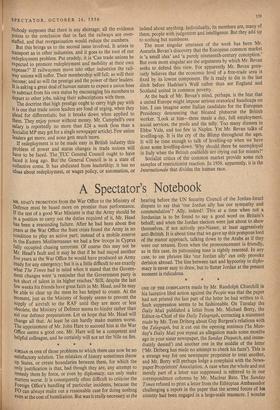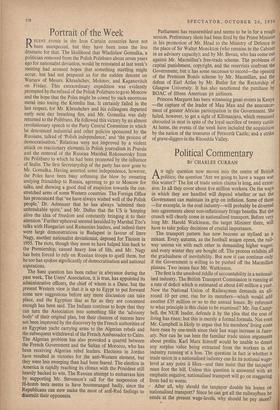hearing before the UN Security Council of the Jordan-Israel dispute
to say that 'our Jordan ally has our sympathy and commendation'? Ally, indeed ! This at a time when not a Jordanian is to be found to say a good word on Britain's behalf; and when the Jordan electors were just about to show themselves, if not actively pro-Nasser, at least aggressively anti-British. It is about time that we gave up this pompous lord of the manor approach, talking down to the Arabs as if they were our tenants. Even when the pronouncement is friendly, as in this case, its patronising tone is rightly resented. In any case, to use phrases like sour Jordan ally' can only provoke derision abroad. The line between tact and hypocrisy in diplo- macy is never easy to draw, but to flatter Jordan at the present moment is ridiculous.
* * *
ONE OF THE COMPLAINTS made by Mr. Randolph Churchill in his lucrative libel action against the People was that the paper had not printed the last part of the letter he had written to it. Such suppression seems to be fashionable. On Tuesday the Daily Mail published a letter from Mr. Michael Berry, the Editor-in-Chief of the Daily Telegraph, correcting a statement made by Mr. Tom Driberg about Guy Burgess's relations with the Telegraph, but it cut out the opening sentence On Mon- day's Daily Mail you repeat an allegation made some months ago in your sister newspaper, the Sunday Dispatch, and imme- diately denied') and another one in the middle of the letter ('Mr. Driberg has made no attempt to check his facts'). This is a strange way for one newspaper proprietor to treat another, and Mr. Berry will perhaps lodge a complaint with the News- paper Proprietors' Association. A case when the whole and not merely part of a letter was suppressed is referred to in our correspondence columns by Mr. Maclear Bate. The Sunday Times refused to print a letter from the Ethiopian Ambassador challenging a report in the paper that the armed forces of his country had been engaged in a large-scale massacre. I wonder
Portrait of the Week
RECENT events in the Iron Curtain countries have not been unexpected, but they have been none the less dramatic for that. The likelihood that Wladislaw Gomulka, a politician removed from the Polish Politburo about seven years ago for nationalist deviation, would be reinstated at last week's meeting had aroused hopes that something startling might occur, but had not prepared us for the sudden descent on Warsaw of Messrs. Khrushchev, Molotov, and Kaganovitch on Friday. This extraordinary expedition was evidently prompted by the refusal of the Polish Politburo to go to Moscow and the hope that the Poles might be cowed by such enormous metal into toeing the Kremlin line. It certainly failed in the last respect, for Mr. Khrushchev and his colleagues departed early next day breathing fire, and Mr. Gomulka was duly returned to the Politburo. He followed this victory by an almost revolutionary speech to the Party Central Committee in which he denounced industrial and other policies sponsored by the Russians, talked of 'Polish independence,' and 'the process of democratisation.' Relations were not improved by a violent attack on reactionary elements in Polish journalism in Pravda and the removal of the Russian Marshal Rokossovsky from the Politburo to which he had been promoted by the influence of Stalin. The first Secretaryship of the party has now gone to Mr. Gomulka. Having asserted some independence, however, the Poles have been busy softening the blow by swearing undying friendship to Russia, agreeing to go to Moscow for talks, and showing a good deal of suspicion towards the out- stretched arms of some Western countries. The Foreign Office has pronounced that 'we have always wished well of the Polish people,' Dr. Adenauer that he has always 'admired their unbreakable spirit,' and Mr. Dulles that the US is 'keeping alive the idea of freedom and constantly bringing it to their attention.' Further upheaval seemed heralded by Marshal Tito's talks with Hungarian and Rumanian leaders, and indeed there were large demonstrations in Budapest in favour of Imre Nagy, another nationalist deviationist, deposed for Titoism in 1955. The riots, though they seem to have helped him back to the Premiership, caused heavy loss of life, and Mr. Nagy has been forced to rely on Russian troops to quell them, but he.too has spoken significantly of democratisation and national aspirations. Parliament has reassembled and seems to be in for a rough session. Preliminary shots had been fired by the Prime Minister in his promotion of Mr. Head to the Ministry of Defence in the place of Sir Walter Monckton (who remains in the Cabinet in an advisory capacity); and by Mr. Bevan, who has come out against Mr. Macmillan's free-trade scheme. The problems of capital punishment, copyright, and the reservists confront the Government; but it has some successes to record—the opening of the Premium Bonds scheme by Mr. Macmillan, and the defeat of Earl Attlee by Mr. Butler for the Rectorship of Glasgow University. It has also sanctioned the purchase by BOAC of fifteen American jet airliners.
Princess Margaret has been witnessing great events in Kenya —the capture of the leader of Mau Mau and the announce- ment of greater African participation in the Government. She failed, however, to get a sight of Kilimanjaro, which remained shrouded in mist in spite of the loyal sacrifice of twenty cattle. At home, the events of the week have included the acquisition by the nation of the treasures of Petworth Castle; and a strike of grave-diggers in the Rhondda Valley.
Political Commentary
By CHARLES CURRAN











































 Previous page
Previous page